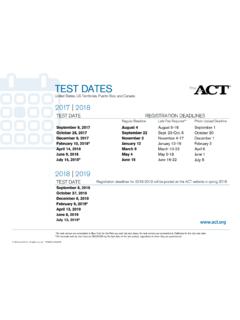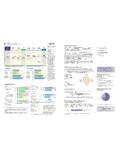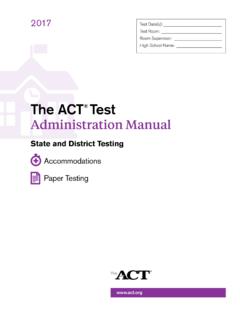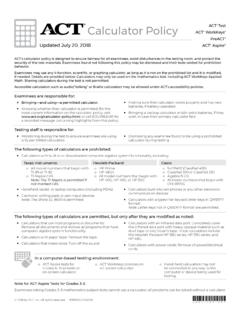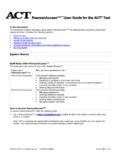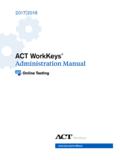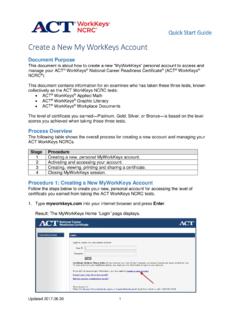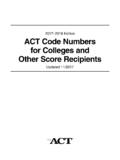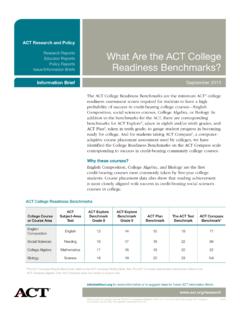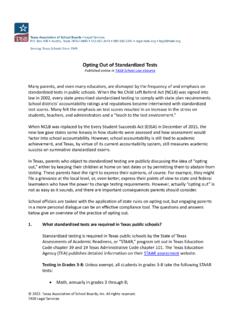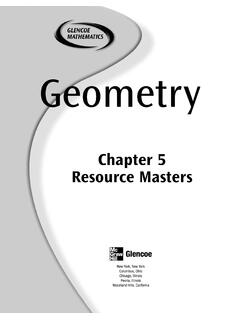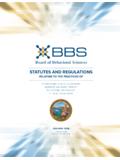Transcription of Preparing for the ACT 2021–2022
1 2017l2018 FREEP reparing for the ACT s Inside Full-Length Practice tests , including a Writing Test Information about the Optional Writing Test Strategies to Prepare for the tests What to Expect on Test DayEsta publicaci n tambi n se puede ver o descargar en espa ol en *080192180*Contents1. General Preparation for the ACT tests ..22. Strategies for Taking the ACT What to Expect on Test Taking the Practice Practice Multiple-Choice Practice Writing Test ..535. Scoring Your How to Score the Multiple-Choice tests ..56 How to Score the Writing Test ..616. Sample Answer A Message to StudentsThis booklet, which is provided free of charge, is intended to help you do your best on the act test . Included in this booklet are complete practice tests retired act test questions that were administered to students on a National test date including a writing prompt, a sample answer document, answer keys, and self-scoring this booklet carefully and take the practice tests well before test day so you will be familiar with the tests , what they measure, and the strategies you can use to do your best on test to for additional act test preparation materials, including ACT Online Prep , ACT Kaplan Online Prep Live, The Official ACT Prep Guide, sample questions, and the Question of the is committed to representing the diversity of society in all its aspects, including race, ethnicity, and gender.
2 Thus, test passages, questions, and writing prompts are deliberately chosen to reflect a range of is also committed to ensuring that test questions and writing prompts are fair and that they do not disadvantage any particular group of examinees. Extensive reviews of the fairness of test materials are rigorously conducted by both ACT staff and external consultants. ACT also employs statistical procedures to help ensure that test materials do not unfairly affect the performance of any : Since the ACT is a curriculum-based achievement test, research is periodically conducted and tests are updated accordingly to ensure test content continues to reflect classroom instruction and remains a relevant predictor of college and career readiness. As a result, you may notice subtle differences between this practice test and the test you actually take on test Preparation for the ACT TestsTest-Taking StrategiesThe ACT contains multiple-choice tests in four areas: English, mathematics, reading, and science.
3 Each of these tests contains questions that offer either four or five answer choices from which you are to choose the correct, or best, answer. The following suggestions apply to all four tests :Pace time limits set for each test give nearly everyone enough time to finish all questions. However, because the English, reading, and science tests contain a considerable amount of text, it is important to pace yourself so you will not spend too much time on one passage. Similarly, try not to spend too much time puzzling over an answer to a specific problem in the mathematics test. Go on to the other questions and come back if there is time. Your supervisor will announce when you have five minutes remaining on each the directions for each test you begin taking one of the tests , read the directions carefully. The English, reading, and science tests ask for the best answer. Do not respond as soon as you identify a correct answer.
4 Read and consider all of the answer choices and choose the answer that best responds to the question. The mathematics test asks for the correct answer. Read each question carefully to make sure you understand the type of answer required. Then, you may want to work out the answer you feel is correct and look for it among the choices given. If your answer is not among the choices provided, reread the question and consider all of the answer each question is important that you understand what each question asks. Some questions will require you to go through several steps to find the correct or best answer, while others can be answered more the easy questions best strategy for taking the tests is to answer the easy questions and skip the questions you find difficult. After answering all of the easy questions, go back and answer the more difficult questions if you have 2017 by ACT, Inc. All rights : This booklet is covered by federal copyright laws that prohibit the reproduction of the test questions without the prior express, written per-mission of ACT, Inc.
5 No portion of this booklet may be copied or distrib-uted without written permission of endorses the Code of Fair Testing Practices in Education and the Code of Professional Responsibilities in Educational Measurement, which guide the conduct of those involved in educational testing. ACT is committed to ensuring that each of its testing programs upholds the guidelines in each Code. You may locate copies of these Codes through the following organizations: Code of Fair Testing Practices in Education: American Psychological Association ( ) Code of Professional Responsibilities in Educational Measurement: National Council on Measurement in Education ( )Use logic on more difficult you return to the more difficult questions, try to use logic to eliminate incorrect answers to a question. Compare the answer choices to each other and note how they differ.
6 Such differences may provide clues as to what the question requires. Eliminate as many incorrect answers as you can, then make an educated guess from the remaining every score on the tests will be based only on the number of questions that you answer correctly; there is no penalty for guessing. Try to answer every question within the time allowed for each your there is time left after you have answered every question in a test, go back and check your work on that test. You will not be allowed to go back to any other test or mark responses to a test after time has been called on that precise in marking your answer sure that you properly fill in the correct ovals on your answer document. Check that the number of the line of ovals on your answer document is the same as the number of the question you are answering and that you mark only one response for each question. Erase you want to change a multiple-choice answer, be sure to use a soft eraser that will not leave smudges and erase the unintended mark completely.
7 Do not cross out answers or use correction fluid or tape; you must erase. Correction fluid/tape, smudges, or unintended marks may cause errors in for Test Day Prepare well in advance for the tests . Know what to expect on test day. Familiarize yourself with the information in this booklet and at Note: Most procedures in this booklet refer to testing on a National or International test date at an act test center. Procedures may differ slightly if you test at another location. Take the practice tests in order and review your responses. Get plenty of rest the night before the tests . Carefully review the Test Day Checklist at Bring the following items with you to the test center:1. Your paper ticket (if you test on a National or International act test date). Failure to bring your ticket will delay your Acceptable photo identification. See details on your ticket or at You will not be admitted without an acceptable photo Sharpened soft lead No.
8 2 pencils and good erasers (no mechanical pencils or ink pens). Do not bring any other writing instruments; you will not be allowed to use them. 4. A watch to pace yourself. Do not bring a watch with an alarm, because it will disturb other A permitted calculator may be used on the mathematics test only. It is your responsibility to know whether your calculator is permitted. For the most current information on the ACT calculator policy, visit or call for a recorded for Taking the ACT TestsThe ACT measures the knowledge, understanding, and skills that you have acquired throughout your education. Although the sum total of what a person has learned cannot be changed, your performance in a specific area can be affected by adequate preparation, especially if it has been some time since you have taken a course in that are three strategies that can help you to prepare yourself for the content included in the ACT:Familiarize yourself with the content of the ACT the information about the tests that is provided on the following pages.
9 Note which content areas make up a large proportion of the tests and which do not. The specific topics included in each content area are examples of possible topics; they do not include all of the your knowledge and skills in the content those content areas you have studied but are not fresh in your mind. Spend your time refreshing your knowledge and skills in the content areas that make up large portions of the the content areas you have not unfamiliar content areas make up major portions of the tests , consider taking coursework to help you gain knowledge and skills in these areas before you take the ACT. Because the ACT measures knowledge and skills acquired over a period of time, it is unlikely that a cram course covering material that is unfamiliar to you will help you improve your scores. Longer-term survey courses will be most helpful to you, because they aim to improve your knowledge through sustained learning and TestThe English test is a 75-question, 45-minute test that measures your understanding of the conventions of standard English (punctuation, usage, and sentence structure), production of writing (topic development, organization, unity, and cohesion), and knowledge of language (word choice, style, and tone).
10 3 The test consists of five essays, or passages, each accompanied by a sequence of multiple-choice test questions. Some questions refer to underlined portions of the passage and offer several alternatives to the underlined portion. You decide which choice is most appropriate in the context of the passage. Some questions ask about an underlined portion, a section of the passage, or the passage as a whole. You decide which choice best answers the question posed. Many questions offer NO CHANGE to the passage as one of the choices. The questions are numbered consecutively. Each question number refers to a correspondingly numbered portion underlined in the passage or to a corresponding numeral in a box located at the appropriate point in the passage. Different passage types are used to provide a variety of rhetorical situations. Passages are chosen not only for their appropriateness in assessing writing skills but also to reflect students interests and experiences.
